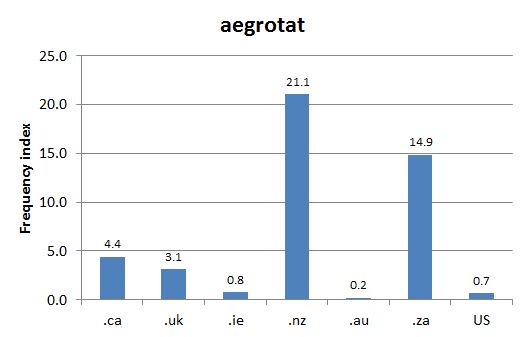DCHP-2
aegrotat formal, AEG, < Latin aegrōtat ‘he/she is sick’ DCHP-2 (September 2016)
adj. — Education, rare
a final grade being assigned for incomplete coursework, usually on medical or compassionate grounds.
Type: 2. Preservation — The term is a contender for a preservation from BrE in CanE. It is a formal term that has been in general decline, but has some currency in the former colonies of New Zealand and South Africa, followed, with some margin, by Canada. Its use in the US is limited (see Chart 1; neither W-3 nor AHD-5 list it).
In the North American context, British forms have traditionally been employed in Canada to distinguish CanE from AmE. For instance BrE pram for stroller, BrE (pay) cheque for (pay) check or pronunciations, e.g. student pronounced as [styoodent] with a palatal glide, instead of [stoodent]. Generally, most British preservations are declining in use today (Chambers 1998a: 28-30), either by specializing to limited registers, such as aegrotat; or they are re-indexed (bestowed) with new social meanings, as CanE develops its own characteristics. An example of the latter would be student pronounced as [styoodent], which no longer necessarily indexes ''Britishness'', but often ''learnedness'' or ''erudition'' (Clarke 2006: 242; see also Chambers 2004 on 'Canadian Dainty', Avis 1973: 62 on a "phony British accent" in Canada).
See also COD-2, s.v. "aegrotat" (2), which is marked "Cdn & Brit.", Gage-1, s.v. "aegrotat", ITP Nelson, s.v. "aegrotat", OED-3, s.v. "aegrotat", W-3, s.v. "aegrotat", which is marked "Brit".'- Canadian academic institutions use the term more frequently than do those in the UK. In the US, aegrotat does not seem to have much currency. The universities of Yale, Harvard and Stanford were founded under British rule, but the term is not found in their current academic policies.
References:
Images:
Chart 1: Internet Domain Search, 23 Jan. 2012
